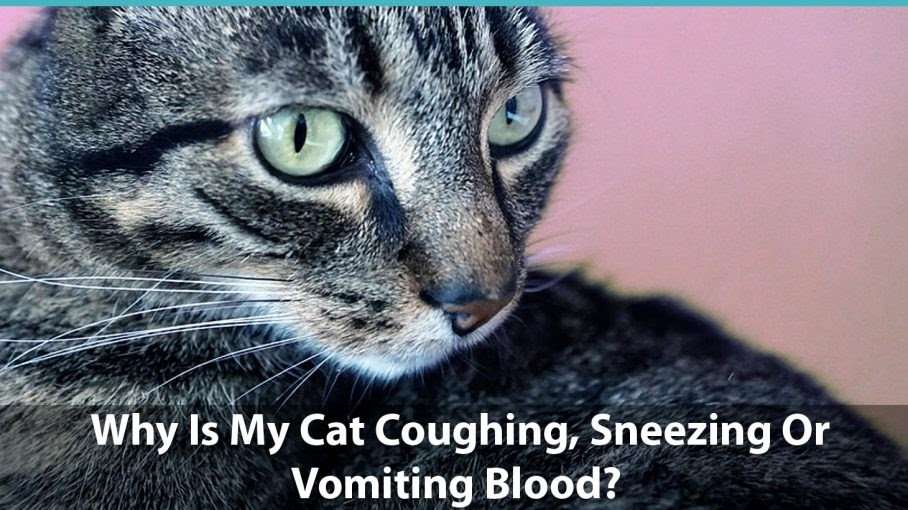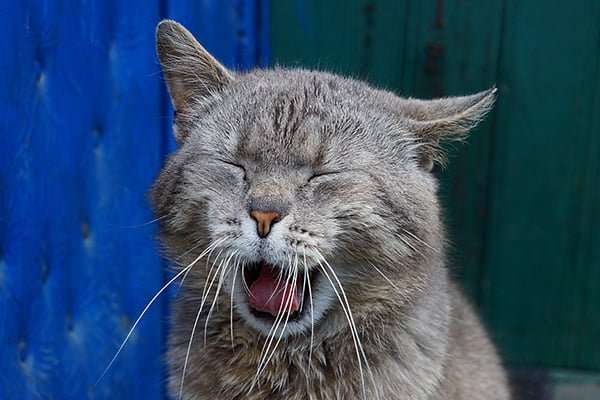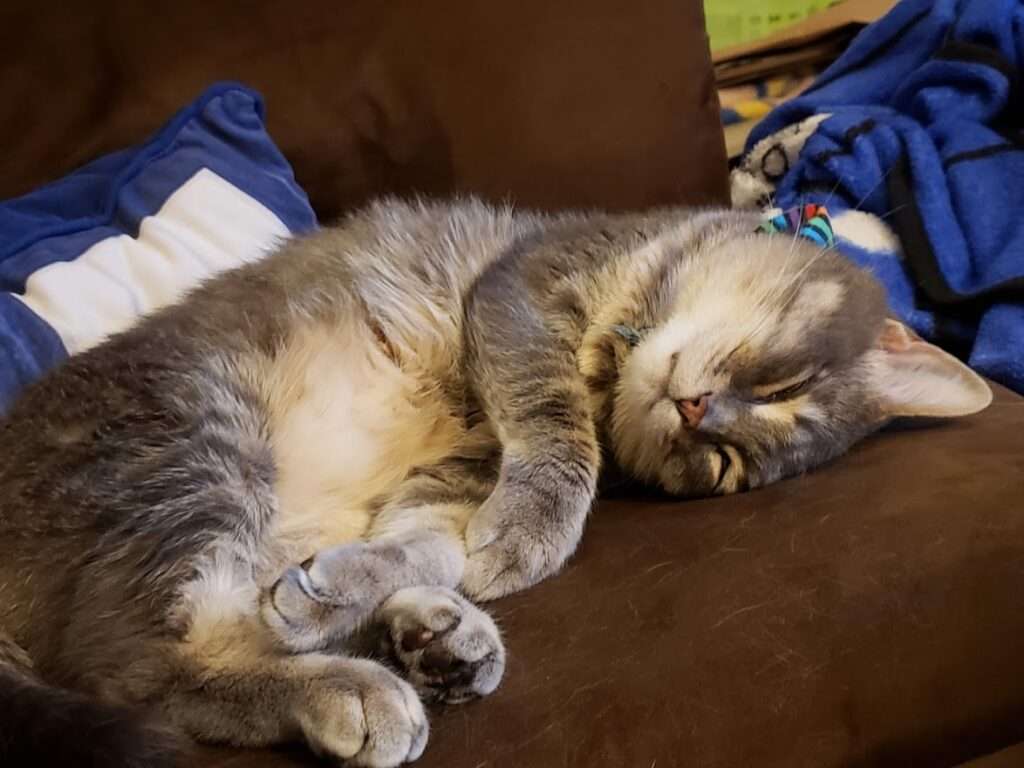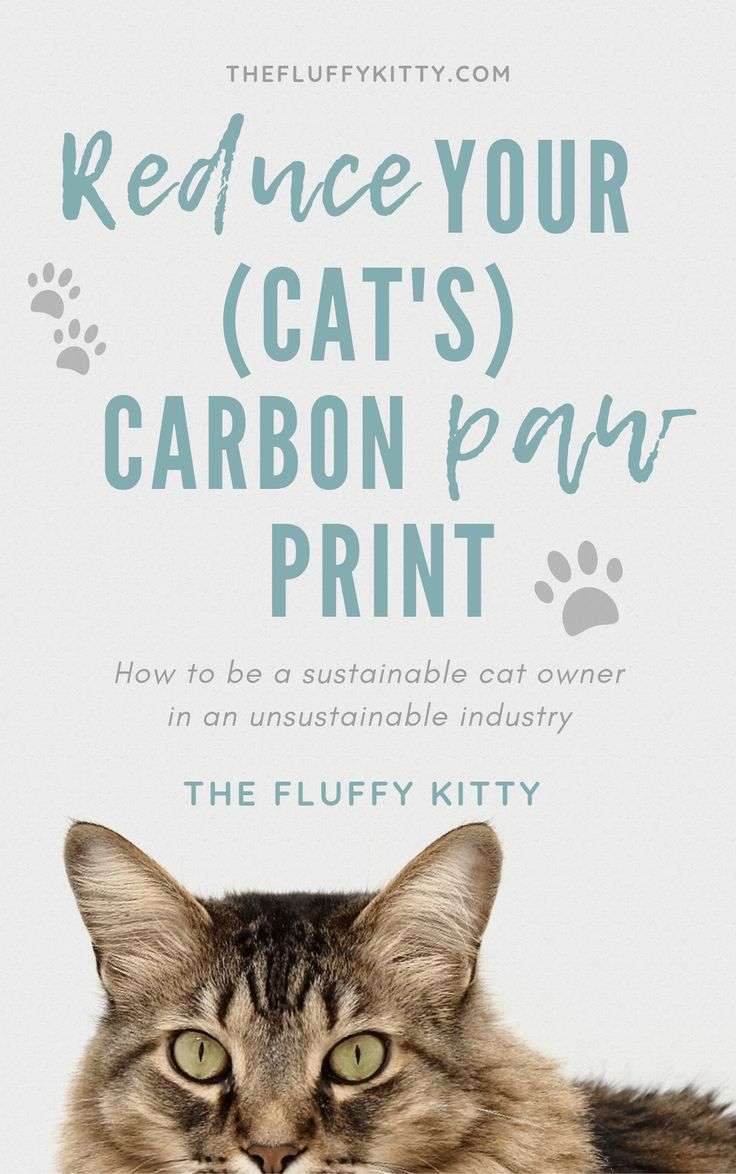When Does A Coughing Cat Need Veterinary Attention
It may be normal for some cats to cough occasionally. As long as the cat is maintaining good health and the cough is not productive , veterinary attention is not immediately indicated.
However, if the cough persists for more than a few days, is severe, is productive, recurs consistently, or if your cat appears sick or is losing weight, you should consult your veterinarian.
Cough Medicine For Cats
Two medications that treat coughing in cats are known as dextromethorphan and guaifenesin. These medications can be found over the counter and in human medications. These are rarely recommended for cats as they are largely ineffective and do not treat the cause of the cough which can worsen with time.
If your cat is coughing, cough medicine is not recommended. He needs to be seen by a veterinarian.
What Causes Cat Coughing
Coughing is a function of the respiratory system, so cat coughing is often a sign that theres some sort of irritation or inflammation involving that system. Its not always the case, though. Leave it to cats to keep us guessing!
1. Hairballs
We all know that telltale hacky-acky sound its the cough that precedes vomiting up a hairball. Dr. Jean Hofve says, In my experience, there are two main reasons for cats to cough: a stubborn hairball, and feline asthma.
2. Upper respiratory infections
A sudden onset of coughing could indicate an upper respiratory infection, which is common in cats. In addition to coughing, other symptoms could include sneezing, congestion, runny nose, coughing, nasal discharge, gagging and decreased appetite.
3. Asthma
A cat with a history of coughing might have asthma. Like in humans, asthma causes the immune system to go into overdrive, which causes inflammation. What that means to the respiratory system is that the swelling could affect the lungs and airways, making breathing difficult. In extreme cases, the inflammation may cause life-threatening distress.
4. Heartworms
Heartworms are spread by mosquitoes and the symptoms are similar to asthma signs.
5. Lung cancer
In addition to coughing, lung cancer symptoms may include pain, difficulty breathing, rapid breathing, lethargy, weight loss and coughing up blood.
6. Congestive heart failure
Get Rid Of Odors And Dust
Cats are very sensitive to strong smells, odors, and dust. If you notice your cat coughing a lot, try to reduce any incense, smoke, or strong detergent odors at home. Thoroughly clean and vacuum your carpets, hardwood floors, blinds, curtains, and couches. Regularly wash the bedding where your kitty sleeps, too, even if that means your own bed. Still hear your little buddy coughing? An air filter may help to reduce the dust and pollen in the air.
How To Help Your Vet

Give them detailed information about the cough:
- Its quality: Does it sound wet or dry?
- Timing: When it happens at night, that’s often a sign of fluid in the lungs or heart failure.
- Triggers: If your cat coughs after exercise, they might have heart disease. If it happens after a meal, it could mean problems with their larynx or esophagus.
Knowing this can help your vet pinpoint the most likely causes, choose tests to confirm a diagnosis, and prescribe the best treatment.
When Is It Time To See A Vet
Since many of these conditions are uncomfortable or painful, its never a bad idea to take your cat to the vet as soon as you notice a problem, even if sneezing is the only symptom.
However, these signs are more serious and require a vet visit sooner rather than later:
-
Loss of appetite
-
Persistence of symptoms beyond a few days
Home Remedies For Cats With A Cough
Cats cough just like we do, and for many of the same reasons. Coughing is a reflex; when something irritates the back of the throat, breathing passages or lungs, the body responds, expelling whatever is causing the irritation. It’s an important mechanism for protecting the lungs and air passages from foreign objects and expelling infectious matter from the body. Just like us, cats have different kinds of coughs: a dry, hacking cough; a moist-sounding cough; a single, gagging cough; a wheezing cough; and that half-cough, half clearing the throat thing.
The type of cough can tell you a lot about what’s causing it. It’s also important to note whether the cough is productive or non-productive. A cough can just be a simple throat irritation, but it can also be a symptom of a much bigger problem. If it gets to the point where you need to talk to your vet about your cat’s cough, being able to describe how it sounds and whether it’s productive can help him or her figure out what’s causing it.
Hairballs and upper respiratory infections are minor compared to what could actually be going on if your cat has a chronic cough. In the next section, we’ll look at some of the other potential causes of coughs in cats.
What Is A Cough
Heres my learn something new every day useless fact, thanks to Medical News Today: a cough is also known as tussis. You can thank me for that at your next trivia night.
A cough is the bodys natural reflex to clear the throat and airways of irritants, which may include foreign particles, fluids and mucous. Its a rapid explosion of air from the lungs either involuntarily or on purpose. Most of the time a cough will do its job of clearing the irritant and go away, but sometimes it can be a sign of a more serious illness.
Have A Cat Cough Question Or Want To Share A Story That Could Help Other Cat Lovers
Do you have a great story or question about cat cough? Share it. Questions will be answered by our Veterinarian for free!Please include information such as cat age, breed, medications, diet, changes in behavior, medical history and other details which could be of help.Our ability to respond quickly is based on the number of questions we receive. If you have an urgent question we suggest using this online veterinary cat answer service that is staffed by vets and available 24 hours a day. You only pay a small fee for answers you accept.
Final Thoughts: Cat Coughing And Gagging
Hairballs are usually the go-to answer for whenever a cat coughs and gags, but we hope this article has informed you that in fact, coughing in cats does not equate to hairballs at least not all of the time!
Never hesitate to consult your vet. Your fluffy kitty will thank you for it!
Please do share any question or comment with the FK community. We always enjoy hearing from our furllowers!
How Is The Cause Of A Cat’s Cough Diagnosed
Because coughing is often associated with other signs of respiratory infection, an extensive initial work up may not be required. However, if the cough is severe, or if it has been present for some time, then further investigation may be needed. A thorough medical history documenting the onset of the problem and its progression, any changes in the cat’s home environment, or any other signs of illness in the cat, will be important.
The diagnostic work-up may include several types of blood tests, including heartworm antigen tests, laboratory cultures of a wash sample from the lower respiratory tract, endoscopic examination and radiography . Ultrasound evaluation of the heart may be necessary in some cases. Your cat may require a sedative for some of these procedures. Many of these tests will also help distinguish coughing from feline asthma.
The Following Are The Most Common Causes Of Cat And Dog Coughing:
Cat Sneezing With Other Symptoms

Cat sneezing in conjunction with other signs is common but doesnt always help us narrow down the cause.
Cat sneezing along with wheezing can suggest concurrent lower respiratory disease.
If a cat is coughing and sneezing, it typically means that its primarily an upper respiratory process with postnasal drip irritating the throat.
If you see nasal discharge, especially with blood or pus-colored mucus, make a note or take a picture before cleaning your cats face, as this can help narrow down the causes. Be sure to clean your cats face, as it causes discomfort for your cat.
Chronic nosebleeds raise the concern for cancer, especially in older cats, but this association is not definitive.
Causes Of Coughing In Cats
There are several different ailments that can bring about a cough. The causes can range from mild to severe. A few of the causes are listed below:
- Tracheal irritation/collapse
- Fluid accumulation
- Upper/lower respiratory tract disease
- Asthma
- Parasitic worms
- Chest/lung tumors
- Nasopharyngeal polyps
- Heart disease
Top
What To Do If Your Cat Is Coughing
First and foremost pay attention! Even if its the first time you see it, youll need to remember a few things about the cough so you can compare it to any future coughs and so you can give your vet an accurate description of whats going on.
Here are a few things to look out for:
- The quality of the cough is it wet or dry, does it last for ages or go away quickly?
- The timing of the cough is it mostly during the day, or at night? These things can help point your vet in the right direction.
- Possible triggers does the coughing happen during or after exercise? During or after eating? Keeping a journal of your cats symptoms is a good idea to help you recognise patterns.
- Any other symptoms look out for lethargy or weight loss, sneezing, wheezing, breathing difficulties or any other symptoms that dont seem right to you.
It should go without saying, but Im going to say it anyway please do not try to treat this at home. Over the counter remedies can be great, but before you make assumptions PLEASE go to the vet, armed with as much information as you can gather.
Treatment for your coughing cat will of course depend upon the underlying problem. Your vet may prescribe antibiotics, anti-fungals, corticosteroids or anti-parasite medications to help clear the problem causing the cough.
Can Cats Get Kennel Cough From Dogs
In dogs, infection with a variety of bacteria and viruses can lead to kennel cough. Bordetella bronchiseptica, mycoplasma, parainfluenza virus, adenovirus type 2, canine coronavirus, and others may be to blamealone or in combination.
Cats are susceptible to some of these pathogens, like Bordetella, but not others. To prevent potential spread, any pet that is sneezing, is coughing, and has discharge from the eyes or nose should be isolated from other pets and examined by a veterinarian.
When Should You Visit The Vet If Your Cat Is Coughing
A cat cough can have several different causes, so it can be difficult to know when to act. The occasional cough with no other symptoms or changes in behavior can be harmless. If at any point the occasional cough increases in frequency or other changes in behavior are noted, it is best to see your veterinarian to rule out any possible causes.
Since many of the conditions causing coughing in cats can be managed or treated, its best to act sooner than later if you have any concerns.
How Do You Treat A Sneezing Cat
Treatment for cat sneezing is typically targeted at the underlying cause where possible.
While a wide variety of treatments are available, owners should be aware that the goal in most cases, especially chronic cases, is to reduce the frequency and severity of symptoms, not to cure them.
More research is needed to fully understand the role that infections play in cat sneezing, but repeated or prolonged courses of antibiotics have proved to be effective in controlling clinical signs.
My Cat Keeps Coughing But Nothing Comes Up
If you cat keeps making choking noises, but you are sure there is no hairball or foreign object, the cough may be due to one of the following causes:
- Asthma: cats with asthma may make noises which sound very similar to choking or coughing. Feline asthma is one of the most common respiratory diseases in cats, affecting about 1% if the population. When an asthma attack occurs in a cat, their lungs will become inflamed, constricting them and making it much harder to breathe. Mild asthma attacks in cats might lead to slight coughing, but an acute attack will require you to take them to a veterinary hospital. You should not smoke around your cat in general, but particularly around a cat with asthma.
- Congestive heart failure: if a cat suffers from heart problems, then coughing may be a symptom. This will likely see coughing happening over a longer period of time. If a heart attack occurs, it may be one of the symptoms, but the others will alert you to an emergency. Some reports find that drugs such as spironolactone can be used to treat cardiomyopathy in cats. Annual or biannual veterinary checkups should be carried out to check vitals such as heart function. Filairiasis is a disease affecting the heart caused by the parasite known as heartworm. This is zoonotic, i.e. it can be passed on to humans.
If you want to read similar articles to My Cat Keeps Making Choking Noises, we recommend you visit our Other health problems category.
Know What Causes Wheezing In Cats
If there’s a foreign body or irritant trapped in a cat’s nose, larynx, windpipe, or lungs, Dr. Bishop says it can cause wheezing. However, wheezing can also be the sign of a much larger health issue. “Along with respiratory infections, such as asthma or pneumonia, wheezing can also be the sign of a cardiovascular issue,” he says. “Wheezing may indicate abnormalities with the heart or large vessels associated with it, which is why it’s best to have an evaluation with your veterinarianthere are several diagnostic options available.”
My Cat Is Coughing Heres Why And What You Can Do

My cat is coughing, but this aint no hairball. Sound familiar? There are a number of reasons why cats cough, but unfortunately we humans tend to think its nothing but a furry throat and we just ignore it and get on with our lives.
Its not a pretty sight, watching poor little kitty hacking away like theres no tomorrow. I can tell you from experience, it looks like the end of the world for the coughing cat and this is seriously freaking disturbing for everyone involved. See what I mean?
Diagnosis Of Dry Cough In Cats
Your veterinarian can recommend a blood test as well as the screeningof multiple organs, stool exams to look for parasites and chest x-rays.
Bronchoscopy can be used for examining larger airways as well as for removal of larger objects stuck in the cat’s airways.
Flushing of sterile fluid into the airways also helps collecting culture for a microscopic exam.
Causes Of Cat Coughing
There are a number of different reasons why your cat may be wheezing, coughing or sneezing. Below are a few of the most common:
Asthma
- Asthma is the most common feline respiratory disorder that our Cordova emergency vets see. Cats who spend at least part of their time outdoors are more likely to develop asthma and may experience a cough as a symptom of the condition.
Allergies
- Like people, cats can also suffer from allergies that make them cough and sneeze or wheeze.
Fungal Lung Infection
- If your kitty spends time outdoors they could pick up a fungus from the soil, and coughing is a common symptom. Fungal infections are most easily treated when caught early.
Heartworms
- Heartworm disease is a deadly condition spread by mosquitos. Preventative medications are available from your vet that can help to protect your cat against this very serious disease.
Lung Cancer
- Lung cancer is another potential cause of a cat cough. Some tumors can be controlled with medication. If not, surgery may be an option.
Pneumonia
- Cat coughing can be a sign of pneumonia. Pneumonia in cats can be diagnosed with x-rays and may respond to antibiotics and other therapies.
Congestive Heart Failure
- Shortness of breath, coughing or wheezing can all be signs of congestive heart failure in cats. If your cat is struggling to breathe it’s time to see your vet. Heart failure can be diagnosed using ultrasound or electrocardiogram.
Tight collars
Worms
Treatments For Other Conditions
- Antibiotics
If an infection is the cause of the cats cough, antibiotics are normally prescribed to improve recovery.9
- Cough Suppressants
Cough suppressants may be prescribed to treat the cough symptomatically.10
- Antiparasitic Drugs
If a parasite is the cause of the cats cough, antiparasitic drugs are prescribed to help get rid of the parasite.
- Avoidance Of Triggers
In the case of allergies, asthma, or other inflammatory conditions, the removal of triggers is key to preventing your cat from coughing. Avoid smoking, spraying aerosols, or using strong chemicals around your pet, and try to use low-dust cat litter.11
If your cat is prescribed medication, it is important to continue to give the medication as prescribed. Do not stop treatment if your cats cough subsides.
Treating Cat Asthma & Respiratory Infections
Fortunately, feline asthma and respiratory infections can be treated. If your cat has been diagnosed with asthma, there are two main types of medications prescribed: corticosteroids to treat inflammation and bronchodilators to expand the airways. These medications come in inhaled, oral, or injected forms, however, inhaled medication is the preferred method.
Inhaled steroids, unlike systemic steroids, do not need to be metabolized by the body. They work by directly targeting the lungs, reducing the likelihood of side effects. Administering inhaled medications to your cat with an inhaler is simple and effective when used with an aerosol chamber , and helps ensure your cat can inhale the full dose of medication.
There is no evidence to support the use of anti-histamines to treat asthma or bronchitis.
Infection Of The Upper Or Lower Respiratory Tract
Viral or bacterial respiratory infections are quite common in cats, especially in cats that are housed in places with high numbers of cats, like shelters and catteries. Cats that are coughing due to an upper respiratory infection may also experience congestion, sneezing, runny nose, and decreased appetite.
Upper Respiratory Infections Or Snuffles
The respiratory tract consists of the nose, throat, sinuses, windpipe and lungs. A cats nose, throat and sinuses are susceptible to a number of different viral and bacterial infections. Feline calicivirus and herpes virus are two of the most common viruses causing upper respiratory infections in cats. Both viruses are transmitted through sneezing, coughing, grooming or sharing food and water bowls. The viral infections can be complicated by secondary bacterial infections.
The symptoms of snuffles in cats are varied and may include sneezing, upper respiratory congestion, runny noses and teary eyes, coughing, gagging, drooling, fever, a loss of, or decreased appetite, rapid breathing, and ulcers in the mouth. Cats with sniffles may develop conjunctivitis in their eyes; have open-mouthed breathing and they may be depressed. Age, vaccination status and physical condition all play a role in a cats susceptibility, but multi-cat households and shelters are most at risk. Cats who have recovered from the viruses may become life-long carriers.
Taking your cat to the vet when you suspect snuffles is important. In severe cases, cats may become dehydrated and require intravenous fluids and antibiotics. Some cats may recover by themselves but some may require antibiotics and other medications. Cats should be isolated from others as the viruses are very contagious.
What Causes Sneezing
Sneezing is a response to irritation of the nasal passages whether from dust, strong odors, or illness.
Inhaled irritants
Pay attention to when your cat is sneezing. Is it when he uses the litter box? When you have been cleaning? After using an air freshener? If you can link the sneezing with a strong odor or dust flying around, then there is no cause for concern.
A few simple changes should do the trick. Try dusting with a damp cloth rather than a dry duster. Purchase litter that has a low dust content. Light candles instead of spraying a chemical freshener . Dont forget to keep candles protected from curious cats!
Virus
The most common reason a cat will sneeze is a respiratory infection, typically caused by feline herpes virus or feline calicivirus. These viruses are highly contagious between cats but, thankfully, cannot be transferred to humans. Treatment involves dealing with the symptoms while your cat fights the virus. Consulting with your veterinarian would be recommended. If the virus results in a secondary bacterial infection, antibiotics can be prescribed.
Other causes of sneezing
While the reason for sneezing is most likely inhaled irritants or a virus, there are some more rare causes to consider. Your cat could have a tooth root infection that is draining into nasal passages, foreign objects such as grass or some debris on the floor, or even tumors in the nasal passage.
How To Provide In

Just like it is for human beings, your cat’s asthma can be triggered by environmental allergens, which is why Dr. Bishop says using air purifiers and low-dust litters at home may help ease wheezing in cats with certain respiratory issues. “Limit or avoid the use of certain candles or scented sprays, as these too can lead to wheezing and asthma-like signs,” he says. “Also, maintaining a healthy weight in your cat can help with asthma and other diseases.”
Why Does My Cat Cough
Coughing can occur because of the overproduction of mucous, which drains down the throat. However, just because your cat coughs, does not mean they have an upper respiratory infection.
Like people, cats can cough for other reasons besides an infection, such as allergies or clearing something from the throat. If youre concerned about your cats cough, see your veterinarian who can help diagnose the problem and recommend appropriate treatment.
On a side note, you should know that cats dont cough because of hairballs. Hairballs develop in the digestive tract, not the respiratory system, and are vomited up. Both vomiting and coughing can cause cats to heave and make similar sounds, so it can be hard for cat parents to tell the difference.
My Cat Is Coughing What Do I Do
Cats can cough for many reasons, and they tend to cough a bit differently than dogs. It often looks like they are trying to hack up a hairball, with their little necks stretched out in front of them. While they may ultimately need some veterinary testing performed, there are a few things you can do at home to help your kitty cats cough.